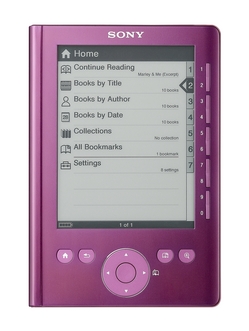Ann Arbor-based Borders, book printers brace for Apple's tablet announcement
The introduction of Apple’s long-awaited tablet device today is prompting an uneven reaction from the Ann Arbor region’s book industry.
The tablet, which is likely to include e-reader capability, could boost sales of electronic books for firms like struggling Ann Arbor-based global book store chain Borders Group Inc.
But, alternately, the Apple announcement could deliver a demoralizing blow to Borders if Apple confirms rumors that it has struck a deal to sell Barnes & Noble’s electronic books on the tablet.
“It’s just another news cycle that Borders is basically left out of,” said Michael Norris, a book analyst for Simba Information.
|
Related story |
The prospect of Apple siding with Barnes & Noble could be frightening. Borders’ stock (NYSE: BGP) slipped 15.6 percent to $0.96 yesterday as investors feared the prospect of the deal and CEO Ron Marshall resigned to join the Great Atlantic & Pacific Tea Co.
In December, Borders invested in Toronto-based Kobo Inc., a division of Indigo Books & Music. Kobo is developing an e-book store for Borders that will be accessible on various devices, including the iPhone.
Earlier this month, Borders said its new Kobo-designed e-book store would be featured on Spring Design’s Alex eReader, which will be released later this year.
Borders, which sells Sony’s e-reader at its super stores, has said it aims to provide its e-books through Kobo’s application on various devices, including the iPhone.
But Borders spokeswoman Mary Davis, responding by e-mail to a voicemail, did not address speculation about Apple’s tablet.
“Our strategy as articulated over time has been to focus on being a high-quality content provider, to be device neutral; giving our customers choice of how they want to consume content to suit their lifestyle and to stress the importance of how relationships--with rewards members for example--can be leveraged,” Davis wrote.

Borders sells the Sony e-reader in its super stores.
Photo courtesy of Sony
Forrester Research projected that various e-readers, including Amazon.com’s Kindle and Barnes & Noble’s Nook, would sell a total of 3 million devices in 2009 and 10 million in 2010.
For Borders, trying to stay in business and compete in the e-reader segment has proven to be a significant challenge.
"It just seems like everything's a bad blow for Borders," said David Fry, founder of Ann Arbor-based Web design and marketing firm Fry Inc. "Borders for the last two years has been so crimped by cash, they can't respond to anything Amazon or Barnes & Noble has done."
Apple’s dive into the e-reader market could also have significant implications for the book printing industry. For book printers, the tablet’s introduction serves as another reminder that digital companies are seeking to uproot their business model.
Ann Arbor-based 117-year-old book printer Edwards Brothers Inc., which reported $76 million in revenue in 2009, is bracing for a possible gradual downturn related to digital book sales.
“We don’t know what it will do,” said John J. Edwards, president of Edwards Brothers, which has about 420 employees in Ann Arbor and another 280 in North Carolina. “So with that uncertainty it can be scary at times, but in the same breath, if it gets more people to read, it could ultimately drive demand. I don’t think anybody really knows.”
Edwards said it’s been difficult to measure the impact of e-books on his business so far.
“We’re cautiously optimistic about the year. You have the e-readers in the background, but you still have today’s needs we’re trying to manage,” Edwards said.
Among the segments e-readers are targeting is the college textbook industry. A transition from printed textbooks to electronic textbooks could save money for students and improve accessibility to information.
But David Mielke, dean of Eastern Michigan University’s College of Business, said digital textbooks aren’t inevitable.
Mielke said he’s interested to see whether Apple’s tablet provides the ability the highlight text, making it easier to study with an e-reader.
“That old classic method of reading and using a highlighter to highlight specific areas that students can then go back and do a review in preparation for a test. Despite all our technological advances, that’s something that students still do. To me, that might be the next step,” Mielke said.
Edwards, who counts on textbooks for a significant portion of his business, said he was skeptical that digital textbooks would quickly overtake the printed version.
“The question is - what do students want?” Edwards said. “It’s hard to envision a paperless classroom in the K-12 through college space. It’s just hard to envision. Now, I’m 49, so maybe I can’t see it.”
Contact AnnArbor.com’s Nathan Bomey at (734) 623-2587 or nathanbomey@annarbor.com. You can also follow him on Twitter.


Comments
Jon Saalberg
Wed, Jan 27, 2010 : 2:36 p.m.
I don't know if Borders can survive this. Look at the e-reader pictured with this story, then watch a demo of the iPad in action. Doesn't look good for the Sony device or Borders.